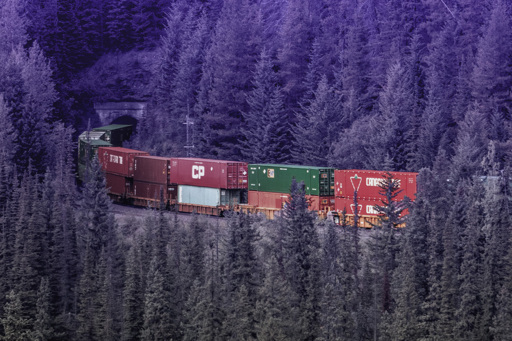These do exist, but the trade barriers of the regulatory kind are not what is holding us back from trading with each other and why it is far easier to trade with the US.
The real trade barrier is the rocky mountains, the fact that Jacksonville is closer to Toronto than Winnipeg, and the other fact that 90% of the Canadian population lives within 160km of the US border.
I would like to tackle these problems, by improving our national railway system.
I was really confused by all this and I could not understand the mechanisms that could even exist to put up trade barriers between provinces. I recently watched a TVO #OnPoli podcast that cleared it up a bit for me. These barriers are not explicit ones like tariffs or other inter-provincial taxes. They are things like having different requirements of a “first aid kit” in each province, so if you want to sell them, you have to consider 12 possibly contradictory standards. They are impedance that comes up incidentally, but while trying to meet some other end. There aren’t [necessarily] provinces intentionally trying to put up trade barriers. They are just managing their own affairs, and these minor barriers are an inevitable consequence of having provincial power at all.
They are things like having different requirements of a “first aid kit” in each province,
There are quite a number of different regulations for commercial vehicle equipment and operation across the provinces.
BC has some rules that were created to address thwir mountainous roads. Ontario has some of the most extensive rules on what the vehicle must be equipped with. The rules surrounding tire chains and studded tires differ across the country.
Of course, ir should be possible to harmonize them all, but that would put added burden on operators in some regions where certain requirements don’t make practical sense.
(Why would a truck in PEI need the same safety equipment as one operating in the BC mountains?)
Yeah, there are some things that can be better standardized, but for most goods industries I don’t think it’s the primary reason the US is more competitive.
No, there are significant regulatory barriers between provinces.
Alberta has hard limits on how much BC wine and produce can be sold in stores. Consequently, its cheaper to get Australian wine in Calgary than from the okanagan valley. Same with fruit, but from the USA.
I get that, and like I said those types of things definitely exist, and yes some specific industry limits do bind sellers like with alcohol. We should ease up on some limits standardize the most confusing regulations where they were different for no good reason. But in terms of the scale of the problem, physical barriers and purely distance seems to be more of an issue to me.
A craft brewery in Vancouver needs aluminum and steel cans, the aluminum is forged in Kitimat, B.C., but the cans are made in either Calgary AB. or Everett, WA., because the can producers in Burnaby, B.C. only makes 473mL cans and can’t supply the volume of 355mL and 473mL cans the brewery needs.
The main reasons why the Everett supplier is more competitive is that the cans arrive more timely and reliably by train or truck because it doesn’t have to go through the mountains, new designs turn around quickly, it would have both lower production and delivery costs than Calgary, that a 25%-50% tariff might not even offset.
Or in another example, if bus manufacturer New Flyer Industries in Winnipeg, MB wanted to switch away from the US (despite 4 out of 5 facilities being located there), they would be avoiding all the vehicle parts manufacturers in Minnesota, Wisconsin and Michigan. If you look to Ontario for any company that makes heavy vehicle parts you might find a what’s left of Bombardier in Thunder Bay, or a little thing in Sudbury or North Bay or the Sault, but beyond that there’s no industry until you go as far south as Bracebridge, ON. Quebec’s industry is still further.
Yeah, those are both good examples of interdependent supply between us and Canada, where it makes sense to keep markets geographically together.
I’m more referring to artificial blocks in terms of provincial barriers put in place for political reasons, like my alcohol example. Historically, these were restrictions for tax reasons between Ontario, Quebec and western Canada, but recent (last 20 years) spats and competition for transfer payments have essentially cut off lumber, paint, car parts, raw minerals, etc between provinces as close as sask and Manitoba.
And that is on top of intangible services gradually being restricted more and more between provinces. As a remote worker and contractor, rules have tightened for me about working in multiple provinces simultaneously.
These measures aren’t there to balance economics, they exist because provinces compete more than they cooperate.
I do wish alcohol would flow more easily between provinces.
They’re really asking to become part of the American oligarchy.
Those “Build Canada” assholes are trying to DOGE us.
One was on the radio the other day talking about how we need to be a country where you can just ‘start building’ instead of dealing with regulations.
I wanted so badly for the interviewer to ask him about pipelines, environment impact, indigenous land, etc.
It was just another tech bro who only knows how to ‘move fast and break things’ or whatever.
The American crisis is exactly the sort of opportunity that is used to push us further away from our genuine interests and further alienate us, a la The Shock Doctrine. This rally around the flag is very concerning to me.
I’m guessing our politicians need to present some hope for Canadians so that we don’t feel as impotent in the face of the threat. When the implementation time comes it really comes around, all sorts of worms are gonna come out of the can and kill the dream.






